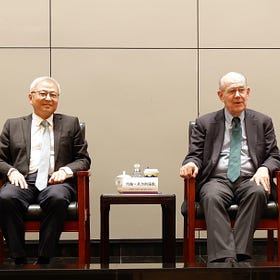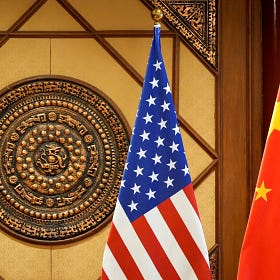YANG Hui on “Global South”: the Rise and Differentiation of “Global South” and China’s Choice
“Global South” is a key balancer in reshaping the international power order.
Welcome to the 8th edition of our weekly newsletter! ChinAffairs+ is a weekly newsletter that shares Chinese academic articles focused on topics such as China’s foreign policy, China-U.S. relations, China-European relations, and more. This newsletter was co-founded by me and my research assistant, ZHANG Xueyu. I am SUN Chenghao, a fellow with the Center for International Security and Strategy (CISS) at Tsinghua University, and currently a visiting scholar at the Paul Tsai China Center of Yale Law School in the United States.
Through carefully selected Chinese academic articles, we aim to provide you with key insights into the issues that China's academic and strategic communities are focused on. We will highlight why each article matters and the most important takeaways. Questions or criticisms may be addressed to sunchenghao@tsinghua.edu.cn
Summary
“Global South” as a description of a structural collective identity, which has evolved with the changes in North-South relations since World War II, and has been infused with connotations such as “colonial rebels”, “economic laggards”, and “neutrals in the game of great powers”. The rise of the Global South is not the result of joint and coordinated actions among southern countries, but rather the result of the superposition of individual countries actions based on their own interests.
Along with the rise of the “Global South” is the differentiation of it, as evidenced by the widening of the North-South divide in development, technical and digital fields, the greater vulnerability of the South in responding to challenges and crises, and internal fragmentation based on internal differences, Western distraction and leadership competition.
The rise and differentiation of the “Global South” makes it a “key balancer” in reshaping the international power order, gives impetus to the degradation of global institutional order to regional institutional order, accelerates the loosening of the international normative order, and thus promotes the multipolarity of the international order.
As the largest “Global South” country, China should support and lead the knowledge production of southern countries, insist on the central position of development in international agenda, promote the high-quality development of the “Global South” corporation mechanism and increase resource investment in global development cooperation.
Why It Matters
Since the twenty-first century, the “Global South” has gradually transformed from the “silent majority” into a key force driving changes in the international order. Countries and international organizations from the South, such as China, India, the African Union, and ASEAN, have not only made significant progress in their own development but have also become important actors in influencing the international landscape, shaping regional situations, and even fostering cooperation among major powers. Developed countries represented by the United States, Europe, and Japan have also recognized the immense potential of the Global South.
However, the “Global South” currently faces numerous controversies and challenges, whether in terms of the concept itself, the definition of national identities, or the actual effectiveness of its participation in international affairs.
First, the concept of the “Global South” has always suffered from the problem of being overly broad, which to some extent obscures the differences in national conditions, development paths, and foreign strategies among developing countries. Meanwhile, here has been significant international debate, with some arguing that China does not belong to the “Global South”, or that it is competing with countries like India and Brazil for leadership within the group. Yet, many also express concern that the concept could be leveraged by certain countries to fuel great power competition or create a new geopolitical battleground. Finally, although the rise of the “Global South” has driven changes in the international landscape and the establishment of international mechanisms, it still faces challenges related to its own development as a group of developing countries, the North-South development gap, and unfair treatment by international institutions.
Despite these concerns, most Chinese scholars acknowledge the positive significance of the “Global South” for China’s foreign policy. The article featured in this edition reflects the mainstream perspective within Chinese academia.
Key Points
The Rise of the “Global South”: The concept of “Global South” originated from the reflection on the political and economic development inequalities between regions. It gradually came to describe post-colonial countries that have faced oppression and still exist in a structurally subordinate position even after independence. The rise of the “Global South” concept is rooted in the decolonization process after World War II and represents the identity of “Southern countries” and their resistance to an unfair international order.
The evolution of the concept of the Global South:The concept of “Global South” has evolved significantly over time. It fundamentally describes a structural collective identity that exists in relation to the Global North or the West. In the 1950s and 60s, the focus was on decolonization, with Southern countries representing resistance to colonialism and hegemony. Since the 1990s, Southern countries have increasingly integrated into globalization, leading to a transformation in North-South dynamics as their economic rise reshapes the international economic landscape. In the wake of the 2022 Russia-Ukraine conflict, the rise of the “Global South” reflects a “political awakening”, as Southern countries assert their strategic autonomy and refuse to align with either side, positioning themselves as a significant force in shaping international order.
The "unconsciousness" of the rise of the “Global South”: The rise of the “Global South” is not the explicit intention of Southern countries, but rather a phenomenon that arises alongside complex geopolitical dynamics and economic development. This complexity indicates that Southern countries are not entirely unified in their objectives. The emergence of the “Global South” is not a strictly mechanized or organized action; instead, it represents an unconscious process resulting from the cumulative actions of individual countries driven by their own interests. Furthermore, Northern and Western countries have also played a facilitating role in this process.
The Differentiation of the “Global South”: The differentiation of the "Global South" refers both to the divide between Southern and Northern countries and the internal divisions within Southern countries.
North-South Divide——Development Gap, Technology Gap, Digital Divide:Despite the rapid economic growth in some Southern countries like the BRICS, the North-South development gap has persisted or even widened. High infrastructure costs, equipment prices, unstable power supplies, and regulatory and adoption restrictions have slowed technological progress in the South, widening the North-South technology divide. At the same time, global Internet connectivity has developed unevenly in recent years, with more and more low-income countries being left behind.
Crisis Vulnerability——Development Lag and International Structural unfairness: Southern countries often exhibit greater vulnerability in responding to crisis challenges. This vulnerability stems from two aspects:
First, the countries of the South lag behind in economic and social development and technological progress, which limits their ability to effectively respond to external shocks;
Second, structural problems inherent in the current international order, including an unequal international economic order, deficiencies in the global governance system, and inequality in resource allocation and environmental issues, have further exacerbated the vulnerability of the southern countries.
Internal Division and Disunity of the “Global South”: The countries of the “Global South” face significant challenges in reaching a consensus due to cultural and developmental differences. This differentiation has its own objective basis and is also influenced by external powers’ meddling and alliances. Some countries exploit internal differences within the “Global South” to exclude Southern nations, further exacerbating the risk of internal differentiation. Additionally, competition for leadership within the “Global South” poses another potential risk for its differentiation.
The “Global South” and the Transformation of International Order: The rise and differentiation of the “Global South” are accelerating the comprehensive restructuring of international power, institutional, and normative orders.
From Passive Recipients to Key Balancers: As the strategic competition among great powers rapidly extends into the “Global South”, this group significantly enhanced its international influence.
Firstly, major powers have increased their resource investments and interest binding with the “Global South”, strengthening control over Southern affairs, as exemplified by the U.S. focus on the "Indo-Pacific Strategy" in recent years.
Second, the “Global South” has significantly enhanced its discourse power in international agenda-setting, with an increasing presence of Southern countries at forums such as the Munich Security Conference, G7, and G20.
Heightened Fragmentation of the International Order:In recent years, the governance mechanism at the global level has been unable to effectively cope with global challenges, leading to the accumulation of global problems. The failure of the global system has sunk the demands of countries to maintain regional security and promote economic and trade cooperation at the regional level, providing space for the development of regional systems.
Ideological Diversification Driving Multipolarity in the International Order: The rise of the “Global South” has challenged the U.S.-led notions of “universal values” and Western centrism. The Global South opposes the binary narratives prevalent in current international politics, advocates for a vision of a de-ideologized international order, and is reluctant to take sides in great power strategic competition, emerging as an important force in adjusting great power relations.
The “Global South" and China’s Choices: China’s active promotion of unity and cooperation among the “Global South” is not aimed at confronting the Western countries, but rather seeks to narrow the North-South gap, foster global balanced and inclusive development, and ultimately achieve the goal of global common development.
China’s Role in the “Global South”: The rise of the “Global South” allows China to accurately define its historical status and global role, identifying itself as a member of this group amidst global turmoil. Sharing similar historical experiences and current challenges, China has strong emotional ties and common interests with other Southern countries, solidifying its position as a key member of the “Global South” based on factual foundations and international consensus.
China’s Role for the “Global South”: As the largest developing country and economy within the “Global South”, China has a unique position and responsibility in promoting the development, cooperation, and governance of Southern nations. China should take a more proactive approach in fostering unity and collaboration among “Global South” countries, working together to build a more just, equitable, and inclusive international order.
China should actively support and guide the production of knowledge resources for the “Global South”, offering public goods in the form of knowledge to foster greater unity among these countries and provide stronger guidance for their future development.China should support and guide the production of knowledge resources for southern countries, provide public goods of knowledge resources for the “Global South”, promote greater unity in the "Global South", and provide better guidance for the future development of the "Global South".
China should continue to prioritize development on the international agenda and promote the high-quality advancement of the “Global South” cooperation mechanisms. It should expand areas of collaboration with an open and inclusive approach, while strengthening partnerships both within and beyond these frameworks.China should continue to put development at the center of the international agenda and promote the high-quality development of the Global South cooperation mechanism. Expand cooperation fields with an open attitude and strengthen cooperation inside and outside the mechanism.
China should increase its resource contributions to global development cooperation, offering substantive support to “Global South” countries. With an open and inclusive approach, China can help these nations achieve sustainable development and promote the building of a global development community.China should increase its resource input for global development cooperation, provide substantive support for the "Global South", help the countries of the "Global South" to achieve development with an open attitude, and promote the building of a global development community.
Conclusion
The rise of the “Global South”, its increasingly diverse landscape, and its vision for the international order remind us that peace and development remain the mainstream demands of the international community. Poverty, inequality, resource shortages, environmental degradation, and technological underdevelopment continue to trouble the majority of the world's population. The rise of the “Global South” also offers China an opportunity to rethink its relationship with the international order. China’s shared historical experiences, development goals, and vision for the international order reaffirm its identity as a member of the developing world and the “Global South”. This further validates that China’s approach to major power diplomacy with Chinese characteristics in the new era aligns with the broader historical trend and global demands.
About the Author
YANG Hui 杨慧, assistant professor at the International Institute for Strategic Studies in Party School of the Central Committee of C.P.C (National Academy of Governance).
About the Publication
The Chinese version of this article was published in Foreign Affairs Review (《外交评论》), which was launched by the CFAU affiliated with Ministry of Foreign Affairs in 1984 and covers topics such as international relations, Chinese diplomacy, diplomatic studies, international economics and law, and academic trends. The journal is a bimonthly publication and serves as a platform for scholarly articles related to international affairs, aimed at academic institutions, foreign affairs departments, libraries, and research institutions.
YAN Xuetong & John Mearsheimer Conversation: Who Shapes Global Order, and Who Will Win the Competition?
On the afternoon of October 11, 2024, John Mearsheimer, renowned American realist and professor of political science at the University of Chicago, engaged in a discussion with Yan Xuetong, dean of the Institute of International Relations at Tsinghua University, on the topic of "Global Order and China-U.S. Relations." This marked their third debate, foll…
GAO Cheng on U.S. Strategic Competition against China and Evolution of Asia-Pacific Regional Order
Welcome to the 7th edition of our weekly newsletter! I recently returned from two conferences in the UK and Italy: the China-Europe Artificial Intelligence Conference in Oxford and the China-US Artificial Intelligence Conference in Venice. Both Track II meetings were incredibly enlightening, and I’m planning to write an article on China-U.S. AI cooperat…










